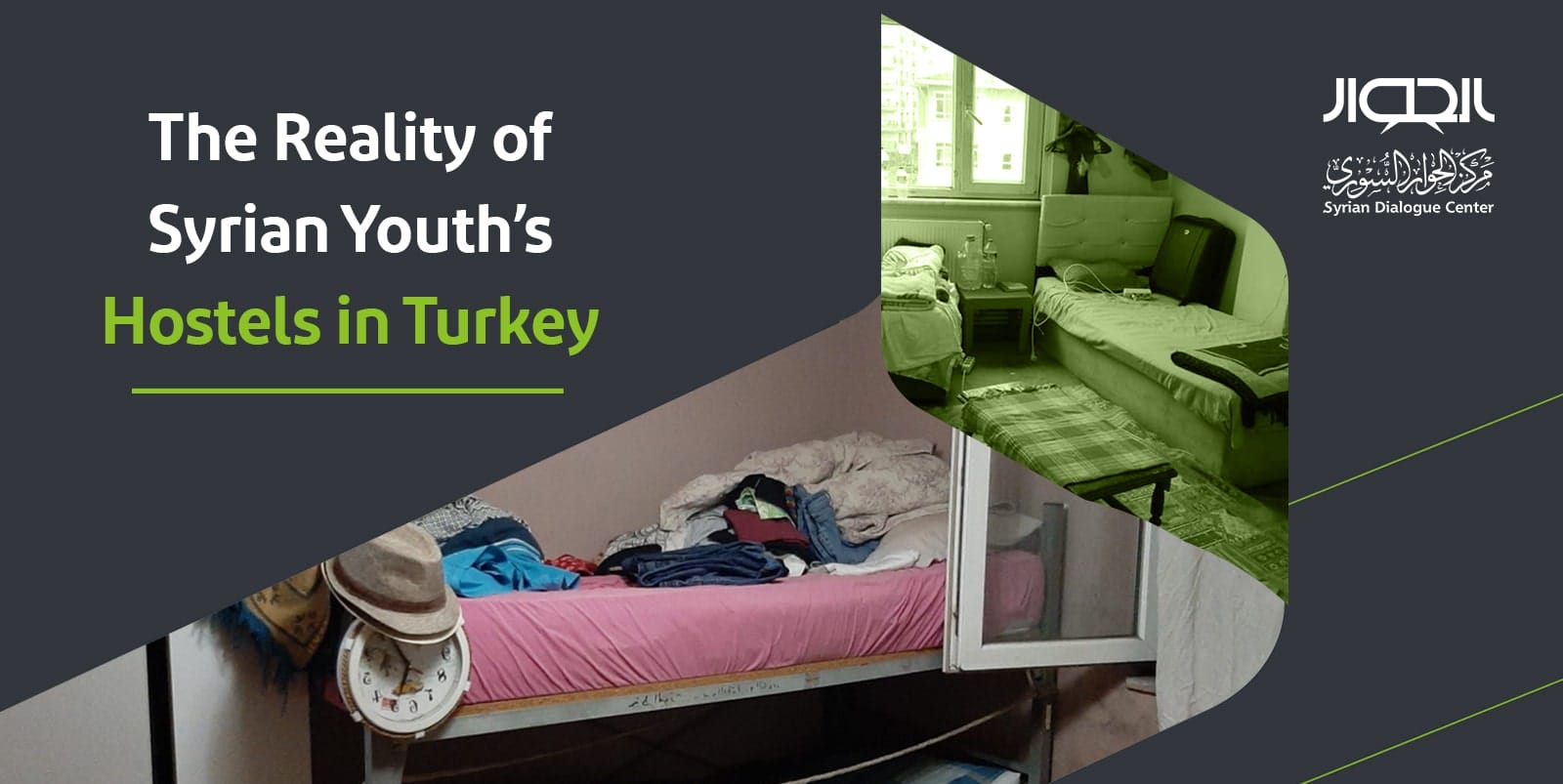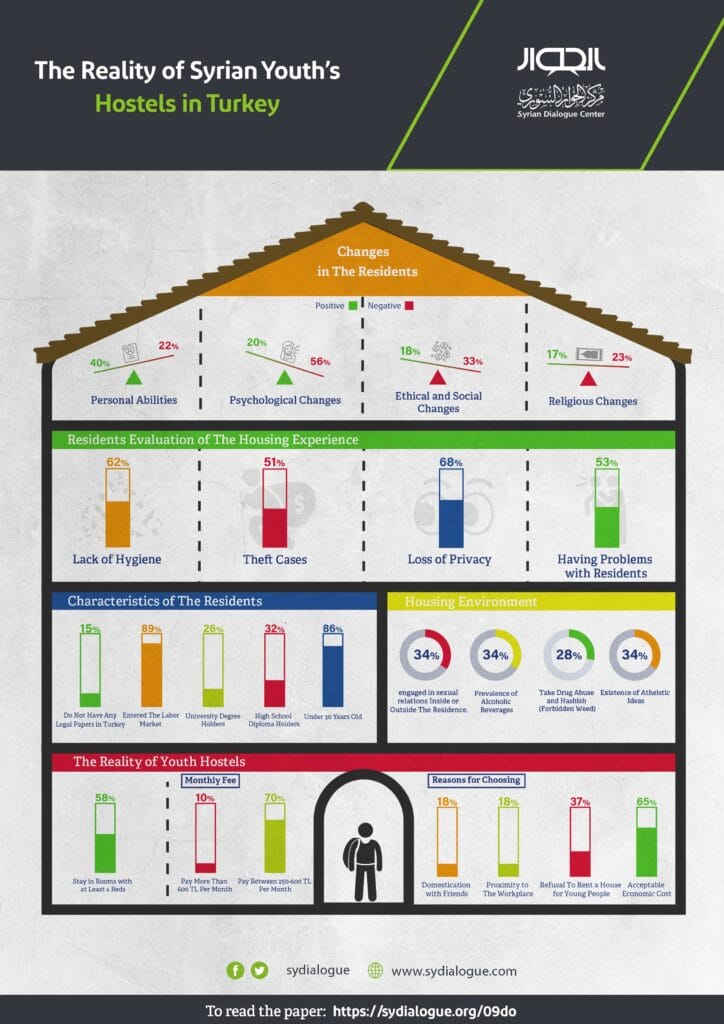
The reality of Syrian youth’s hostels in Turkey
Research paper
Executive summary:
The number of youth housing increased between 2013-2016, a period that witnessed the largest waves of asylum to Turkey and Europe. These housing units met the need for temporary and cheap residence for many youths coming to Turkey to work or go to Europe, and many Syrians dealt with it as a profitable investment project.
Youth housing can be defined as a house managed for an investment purpose by an individual or body, a large number of single young people live, each of whom receives a bed and a wardrobe, and they sharing public and health facilities, where the number of individuals in one room ranges from one to 6 people or More, the monthly fee ranges between 250-800 Turkish liras, depending on the number of people living in one room, the place of residence and the services it provides.
Youth hostels are considered one of the heterogeneous environments that include numbers of youths with different age brackets, nationalities, educational level, religious, moral, cultural, and regional backgrounds in large and renewable numbers, which raises the ire of Turkish society, especially since the Turkish people are usually strict about issues of hygiene and noise. In addition, they express reservations about renting to foreign families due to the differences in cultures, and these reservations become even greater when the tenants are a group of single young men without their families, with a lot of quarrels and disagreements among those youths.
The housing environment is considered a suitable environment for the outbreak of problems among its residents, for many reasons including the absence of standards and controls in accepting residents, and the lack of commitment by some residents to the internally agreed-upon rules for housing management, or because of receiving guests and friends, as well as trespassing on the privacy of other people and their frequent inconvenience and staying up late.
The kinds of problems in youth housing vary, where communication problems appear to be present as a result of the absence of the ability to conduct a common dialogue, so most simple dialogues end with contention, and the absence of privacy as a result of the limited space allocated for each of them and using of common facilities may be an additional reason for the high frequency of problems among residents as well.
The results of the questionnaire indicated that 40% of small residences received between 8-12 people, while 28% of them received numbers ranging between 13-20 person, while the large residences received 86% of it includes numbers ranging between 21-50 people, and 58% of the respondents indicated that they are currently living in a room with at least four beds.
Among the patterns of problems that are strongly present in youth hostels are incidents of theft, as 51% of respondents indicated that there are cases of theft that spread clearly in youth housing, as most cases of theft are carried out by one of the residents, including electronic devices, money, identification papers, and even personal clothes.
On the other hand, youth housing is considered an environment in which there are no health conditions suitable for living, where overcrowding, lack of hygiene, and lack of healthy food cause the spread of epidemics and infectious diseases, in addition to the presence of a segment that suffers from clear health problems and needs health care and medicines on a regularly.
In addition to all this, the residents of the youth hostels suffer from a sort of legal problem, which is that some of them do not have legal residency papers so far) Temporary Protection Identity or kimlik ). Not only problems related to the presence of some youth, but also many of them may engage in illegal activities such as smuggling or using drugs and “hashish” (forbidden weed) or promoting it or trading it. Moreover, managing some activities of prostitution or dealing in frozen dollars or betting applications, in addition to the possibility that some of the youth of these dwellings may be involved in fraud and exploitation.
The experience of youth hostels has affected the residents negatively sometimes and positively at other times. The negative changes that occurred to the residents of the youth hostels emerged in the form of a negative change in the degree of religious commitment, especially commitment to perform prayer with 28% of the surveyed segment. In addition to the negative change in adherence to religious teachings related to Halal and Haram with 25% of this segment, while one-third of the surveyed segment appears to have undergone changes towards their ideas about religion, 17% of it has been exposed to negative changes, and 17% has been exposed to positive changes.
On the other hand, the results of the questionnaire show that the case of youth hostels does not encourage religious or even moral commitment, as 70% of the answers indicated the spread of blasphemy and profanity words, while 34% indicated the presence of atheistic ideas and spread among youth in varying proportions, also indicated by 31% From respondents to negative changes occurred on them in terms of acquiring bad habits and obscene words more than before, as a result of their influence on the surrounding environment.
On the other hand, to track behavioral and moral deviations, alcohol and cannabis spread among 13-18% of the surveyed youth hostels, while 24% indicated that they encountered some individuals engaging in illegal relationships inside or outside the housing.
The negative effects of the youth hostels experience seem clearer from a psychological side, as two-thirds of the respondents indicated a deterioration in their psychological state after this experience, while 45% of them stated that they look more negatively to the future than before, communication of youth with their families decreased by one-third of the respondents.
On the positive side, the youth hostels provided an alternative social environment that compensated the youth for losing his family and moving to other societies with differences in culture and language, the results of the questionnaire indicated that 58% of the youth hostels residents met new Syrian friends in Turkey, which helped them to obtain job opportunities. This experience also enhanced the self-confidence of 33% of the respondents and increased the ability to take responsibility with 46% of the respondents.
The female hostels are similar in most respects to the youth hostels, but they have much better conditions in terms of cleanliness, discipline with the rules and principles, and the number of residents. They are more definitely expensive, and there are different patterns of problems and some immoral behaviors spread among them, but still less than the male hostels.
The needs of the youth hostels segment focus on the need for effective communication and guidance, and obtaining an alternative place to live, in addition, they need some supporting for marriage projects or small businesses projects, and skills development courses whether vocational or language courses, in addition to the need for some legal and psychological advisory services and some projects compensatory education.
Most civil society organizations and some advocacy entities, show a clear reluctance to conduct some programs and projects for these groups of youth, which is due to the lack of knowledge of these organizations about the reality of this segment, its problems, needs, and challenges of securing support and funding. in addition to the absence of specialists who can deal with these groups, interacting with its overlapping problems, especially that it suffers from a mixture of moral, intellectual, family, and societal problems, which mixed with the repercussions of war and asylum combined to create a kind of indifference.
The paper put forward a set of recommendations targeting Syrian and Turkish civil society organizations before anything else, also is focused on the need to go with this segment by conduct projects that meet their needs and secure better conditions of residence, and gradually deal with them in a phased manner and step by step in an attempt to rebuild a state of mutual trust, then these organizations can establishing direct and targeted projects seek to develop the expertise of this segment, raise its awareness and help it to reduce the negative changes it has been exposed to and direct its capabilities towards the right channels to serve it and its communities.
Recommendations:
As part of the joint resolution of some of the problems affecting young people living in youth hostels, this paper offers a set of recommendations:
- Steering the Syrian organizations, associations, and bodies to establish youth investment housing under supervision and controls that try to accommodate this segment, provide supportive services that meet their living needs, and offer a set of optional awareness and advisory programs that are developed according to a prior plan and study.
- Steering the residents of youth hostels with some charitable projects, through the establishment of a charitable kitchen or a restaurant that provides lusty cooked meals with subsidized prices.
- Establishing recreational activities and periodic trips targeting this segment and helping them to obtain targeted and safe entertainment, through which bridges of trust are built between these young people and organizations.
- Supporting and encouraging marriage projects and group weddings, which is supporting by some entities provide financial aid to these youths who are about to get married, in addition to pre-qualifying courses to marriage.
- Establishing Syrian-Turkish projects targeting youth on both sides, seeking to interact with their problems and protect them from falling into addiction problems and getting involved in illegal or immoral acts.
- Establishing Syrian-Turkish counseling centers that provide free specialized counseling services in one of the fields, whether legal, psychological, religious, social, or economic, helps individuals to find solutions to their problems, obtain professional help, or know the necessary steps to correct their legal situation.
- Create useful programs and games that can target young groups and help them to have a fun and useful time.
- Establishment of sports clubs for certain associations and organizations interested in the discovery and sponsorship of sports talents, establish sports teams and provide physical fitness and bodybuilding equipment required for these teams and clubs.
- Launching scouting and educational camps targeting this segment, especially during long vacations and
- Launching competitions to discover talents and sponsoring them, providing subsequent training that would enable these talents to be refined and invested.
- Providing various training for youths, whether language or vocational training at varying levels, in which the individual can learn a new profession or gain advanced experience in a profession he knows.
- Providing scholarships and flexible educational programs that help young people to complete their university or pre-university education, providing financial and logistical assistance to register in universities or those scholarships.
- Introducing some Turkish entities or institutions that provide psychological, educational, or professional services that receive Syrians and Turks; Where such courses allow to associate with Turks socially and integrate with them.
- Preparing and training some cadres from youth hostels to influence their peers and present positive valid models from the same environment that can be more able than others to guide young people and help them to overcome their problems unobstructed.

مؤسسة بحثية سورية تسعى إلى الإسهام في بناء الرؤى والمعارف بما يساعد السوريين على إنضاج حلول عملية لمواجهة التحديات الوطنية المشتركة وتحقيق التنمية المستدامة





